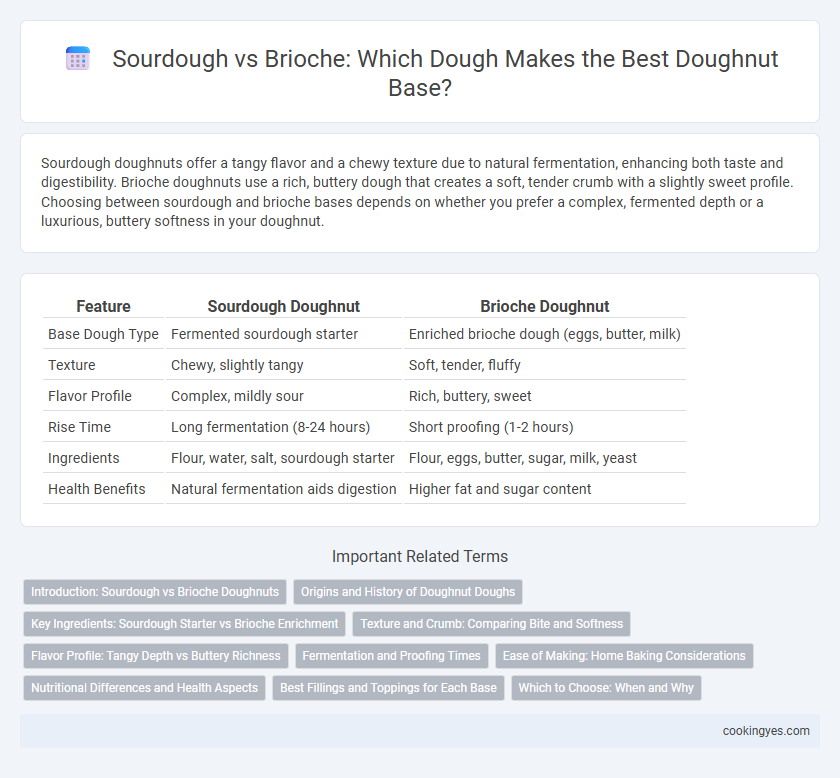Sourdough doughnuts offer a tangy flavor and a chewy texture due to natural fermentation, enhancing both taste and digestibility. Brioche doughnuts use a rich, buttery dough that creates a soft, tender crumb with a slightly sweet profile. Choosing between sourdough and brioche bases depends on whether you prefer a complex, fermented depth or a luxurious, buttery softness in your doughnut.
Table of Comparison
| Feature | Sourdough Doughnut | Brioche Doughnut |
|---|---|---|
| Base Dough Type | Fermented sourdough starter | Enriched brioche dough (eggs, butter, milk) |
| Texture | Chewy, slightly tangy | Soft, tender, fluffy |
| Flavor Profile | Complex, mildly sour | Rich, buttery, sweet |
| Rise Time | Long fermentation (8-24 hours) | Short proofing (1-2 hours) |
| Ingredients | Flour, water, salt, sourdough starter | Flour, eggs, butter, sugar, milk, yeast |
| Health Benefits | Natural fermentation aids digestion | Higher fat and sugar content |
Introduction: Sourdough vs Brioche Doughnuts
Sourdough doughnuts use naturally fermented starter cultures, resulting in a tangy flavor and a chewier texture with complex aromatic notes from lactic acid bacteria fermentation. Brioche doughnuts incorporate rich ingredients like butter, eggs, and milk, offering a tender crumb and a slightly sweet, buttery taste ideal for a soft, fluffy base. The fermentation process in sourdough contrasts with the enriched, yeast-based brioche dough, fundamentally influencing texture, flavor depth, and shelf life.
Origins and History of Doughnut Doughs
Sourdough doughnuts trace their origins to traditional sourdough bread-making, leveraging natural fermentation for a tangy flavor rooted in ancient baking methods dating back thousands of years. Brioche doughnuts, derived from the French brioche bread, emerged in the 15th century, characterized by a rich, buttery dough due to high egg and butter content, reflecting European pastry innovations. Both dough bases highlight distinct cultural histories and fermentation techniques that contribute uniquely to the texture and taste of doughnuts.
Key Ingredients: Sourdough Starter vs Brioche Enrichment
Sourdough doughnuts use a natural sourdough starter, which provides a tangy flavor and a chewy texture due to wild yeast fermentation, while brioche doughnuts rely on a rich brioche dough enriched with butter, eggs, and sugar, resulting in a tender, buttery crumb. The sourdough starter enhances fermentation complexity and gluten development without added fats, contributing to a distinctive crust and open crumb structure. In contrast, brioche enrichment creates a soft, fluffy base with a slightly sweet profile, ideal for a lighter, airy doughnut with a golden sheen.
Texture and Crumb: Comparing Bite and Softness
Sourdough doughnuts offer a tangy flavor with an open, airy crumb that provides a chewy yet light bite, creating a distinctive texture due to natural fermentation. Brioche doughnuts feature a rich, buttery base with a tight, tender crumb, resulting in a soft, pillowy bite that melts smoothly in the mouth. The fermentation process in sourdough enhances complexity and chewiness, while the enriched dough of brioche emphasizes softness and richness.
Flavor Profile: Tangy Depth vs Buttery Richness
Sourdough doughnuts offer a unique tangy depth due to the natural fermentation process, which develops complex sour notes enhancing the overall flavor profile. Brioche doughnuts, in contrast, provide a buttery richness characterized by a tender crumb and subtle sweetness from the enriched dough made with eggs and butter. Choosing between sourdough and brioche bases directly influences the taste experience, catering either to lovers of sharp, fermented tang or those preferring creamy, indulgent textures.
Fermentation and Proofing Times
Sourdough doughnuts rely on natural wild yeast fermentation, requiring longer proofing times of 8 to 12 hours to develop complex flavors and a slightly tangy taste. Brioche doughnuts use commercial yeast, which allows for shorter proofing times of 1 to 2 hours, resulting in a softer, richer, and buttery base dough. The extended fermentation of sourdough promotes better gluten development and leavening, while brioche offers a tender crumb ideal for enriched doughnuts.
Ease of Making: Home Baking Considerations
Sourdough doughnuts feature a naturally fermented base that requires longer proofing times and careful temperature control, making them more challenging for home bakers to master. Brioche doughnuts use a rich, egg-and-butter dough that is more forgiving and quicker to prepare, ideal for beginners seeking a tender, fluffy texture. Home bakers often prefer brioche bases for ease of mixing and rising, while sourdough demands patience and experience to achieve optimal flavor and crumb structure.
Nutritional Differences and Health Aspects
Sourdough doughnuts typically contain natural fermentation cultures that enhance probiotics and improve digestive health, offering a lower glycemic index compared to brioche doughnuts. Brioche doughnuts, made with enriched butter and eggs, tend to have higher fat and calorie content but provide more protein and vitamin A. Choosing sourdough bases may support better gut health and blood sugar management, while brioche bases offer richer nutritional density with increased energy value.
Best Fillings and Toppings for Each Base
Sourdough doughnuts pair exceptionally well with tangy fruit fillings such as raspberry or lemon curd, which complement their subtle sour notes, while toppings like powdered sugar or a light glaze enhance their airy texture. Brioche doughnuts, rich and buttery, are best filled with custard, chocolate ganache, or caramel, and topped with crushed nuts, sprinkles, or a thick chocolate drizzle to highlight their dense, soft crumb. Choosing fillings and toppings that match the dough base's flavor profile maximizes taste harmony and texture contrast.
Which to Choose: When and Why
Sourdough doughnuts offer a tangy flavor and chewy texture due to natural fermentation, making them ideal for those seeking a complex, artisanal taste. Brioche doughnuts feature a rich, buttery base with a tender crumb, perfect for a soft, sweet treat that balances lightness and flavor. Choose sourdough for a distinctive, probiotic-rich option and brioche for a classic, indulgent experience suited for traditional palates.
Sourdough Doughnut vs Brioche Doughnut for Base Dough Infographic

 cookingyes.com
cookingyes.com